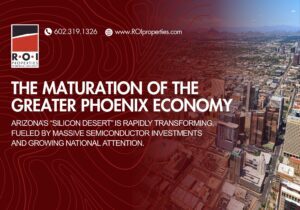
In times of low interest rates and churning stock market prices, real estate investing becomes increasingly appealing. Buying and owning commercial properties, however, isn’t as simple as most residential transactions. Beyond location and price, there are numerous additional factors to consider—and an increased need for discipline in purchasing and operating such properties profitably.
As with the stock market, too many people make real estate investment decisions for the wrong reasons. It’s easy to see the appreciation building in the marketplace and being tempted by the numbers—while believing that the fundamentals don’t matter as much in a rising environment. Whether you’re seeking property for your own portfolio or for a client’s, the following habits will help you put the focus where it belongs: return on investment (R.O.I.).
- Identify the real estate asset class that resonates with you. Success starts with being disciplined about what type of asset class you want to invest in, and what the returns should look like. That means setting specific parameters, not just jumping in because a given deal sounds good on paper. Whether you’re drawn toward single family or multifamily residential, office, industrial, retail, mini-storage, or hotels, go through a thoughtful exercise of why you want to own real estate, how you will operate the property, and what your expectations are from the investment.
- Assess your appetite for risk, reward, and work. Net-lease deals, in which an investor buys a property with a tenant in place, can be viewed as “mailbox money”: You get a check each month and run to the bank. You’re plugging into an income stream, so your risk is low, but your return will also be on the lower end of the scale, most often in the 5-6 percent cap range. In contrast, heavy-touch assets may be available at a higher cap rate/per unit rate, delivering 8 percent or more return on investment, but the leases will likely be shorter term, and there will be more management responsibilities, on the part of the owner. This can mean re-tenanting, rebuilding portions of the building, repositioning the property, re-working parking plans/signage, and many other tasks.
- Define how you will manage the property. In most cases, commercial real estate assets require a lot of active management on top of your existing work week—particularly if you choose to take on the lead role. Even if you hire a third-party manager, you will want to meet with the tenants and actively engage in the property as an owner, in order to be an engaged and responsible property owner/investor, and garner the type of returns you want as an investor.
- Be disciplined about valuation. In commercial real estate, comparable sales and listing information is more difficult to come by, and there are numerous components in underwriting a deal and calculating income streams and returns. If you’re working with the right expert, they will be able to show you comparable sales and current, competitive “for lease”, and vacancy rates. This is critical: If the lease in place is high and you’re calculating your return on that basis, for example, you’re going to be paying too much for the asset. One of biggest mistakes investors make is buying into pro-forma financials, versus digging deeper to obtain the actual numbers. The better approach is to assume the market will stay the same or decline, particularly if there is strong competition with newer product coming to market. In the Greater Phoenix Area, we have over 7,000 multi-family units coming to market in urban infill areas. This will make it more difficult to compete for older properties. So… it is important to ensure that you are buying multi-family properties today, taking into account a potential decline in rental rates New apartment construction may signal that the market is hot, but it’s also going to be tougher to compete because prospective tenants will be drawn to the newer properties.
- Do your physical due diligence. With residential properties, most purchases are made with a turnkey assessment by a home inspector, but on the commercial side it’s a little difficult to find a single entity to assess all of the building components. Because the systems are more sophisticated—and because of the greater dollar investment—you may need to enlist electricians, HVAC contractors, roofing contractors, and other specialists.
- Vet your third parties. Brokers and other experts should be able to answer very strategic questions as far as their experience in a specific asset class and submarket. How much work do they do with investors? How do they split their time between representing owners versus buyers? Are there any conflicts of interest?
Ultimately, investing in commercial real estate is a team effort—it’s simply too complex to expect even the most dedicated do-it-yourselfer to go it alone. From valuation, contract negotiations, and acquisition to lease-up, management, and eventual sale, enlisting experts in specific fields can ensure that your investment delivers appropriate returns.
Beth Jo Zeitzer is the Owner and Designated Broker of R.O.I. Properties, a full-service real estate brokerage firm, which works with investors, business owners, and property owners, regarding the valuation, management, marketing and sale of Commercial and Residential properties, including office, industrial, retail, multi-family, hospitality and land assets. Beth Jo is an attorney by training, and former Corporate Counsel for Del Webb Corporation. She can be reached at 602-319-1326 or [email protected].










